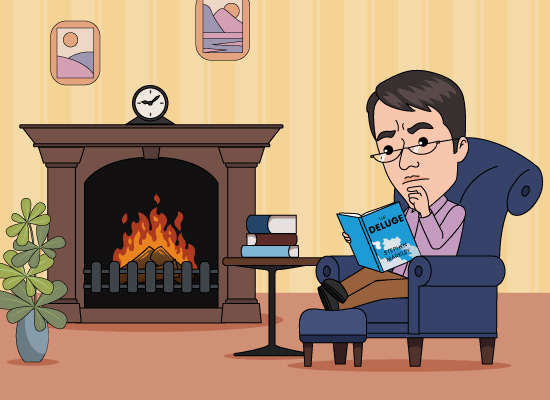The Art of Forecasting
Read this book and wake up to the future.
How does an analyst forecast an organization’s success? Typically, they begin with a “SWOT” (Strength-Weakness-Opportunity-Threat) analysis, with a lot of focus on what the organization is doing to address the T.
But if you don’t see a threat, or see it fully, you can’t address it fully either. One of the biggest risks in public affairs and in business is not so much the threat itself, but having a blind spot. And one solution to this can be found in the seemingly unlikeliest of places.
Fiction.
When I tell my friends about novels I'm reading, they regularly tell me they can’t afford the time to read fiction. But I tell them they cannot afford not to.
It's not easy to anticipate the future. I'm certainly not very good at it. Take events from the last several years: The election of President Trump, the outbreak of COVID-19, the January 6th insurrection, Russia's invasion of Ukraine, the unraveling of George Santos’s resume, the rise and fall of FTX, or even the sudden explosion of ChatGPT. I didn't see all of that coming. Did you?
What about the future for one of The Instigator’s regular topics — climate change?
What will it look like? How bad might this actually get? Fiction can help us imagine and evaluate the possibilities, and then do something about them.
Maybe you know to expect extreme weather, rising sea levels, droughts, floods, and destructive fires. But how destructive might they really be? And are you also thinking fully about refugee crises, mass shootings, environmental terrorism, tribalism and identity politics gone wild, in addition to economic crises worse than anything ever seen before?
Author Stephen Markley is thinking hard about all of this. And he wants us to understand that all of these threats may be on the horizon. His brand new powerful novel, The Deluge, presents a scarily plausible tale set against the backdrop of continuous climate disaster that unfolds over several decades. It's like watching the news on a very bad night but instead of just a couple of isolated segments, everything keeps picking up speed and getting worse. One bad development begets another. Climate change ultimately very dangerously impacts just about every aspect of life on earth.
This is something that great books are good at — helping readers wake up to future possibilities and more clearly understand their implications.
The Deluge is huge and sprawling (kind of like climate change). The book has so many key characters it can be difficult to keep them all straight, and the plot is both terrifying and tortuous. Perhaps the book could have been edited further, but the writing is so good it doesn't really matter. It’s difficult to put the book down or to stop thinking about it. It’s haunting.
Literary criticism is certainly not The Instigator’s usual beat. But climate novels like The Deluge and others we have recommended in the past (Ministry for the Future,Termination Shock, and Venomous Lumpsucker) help drive home the gravity of our environmental concerns and the breadth of their impact. They are compensation for our blind spots. And just as no one is exempt from the pending devastation, our hope is that it motivates (or scares) readers of all stripes to create their personal environmental game plan.
Yes, the climate problem is overwhelming in scale. And yes, what we need most are systemic level changes. But such solutions can begin with small steps by individuals.
What can you do? We’ve suggested key tasks before:
Help accelerate the "electrify everything" strategy and the IRA bill.
Push your organization (company, university, church, union, NGO) to do more.
And more (of course). Please let us know what you think we should be doing and reading. Because as The Deluge makes clear, we’re in this together.
Onward,


